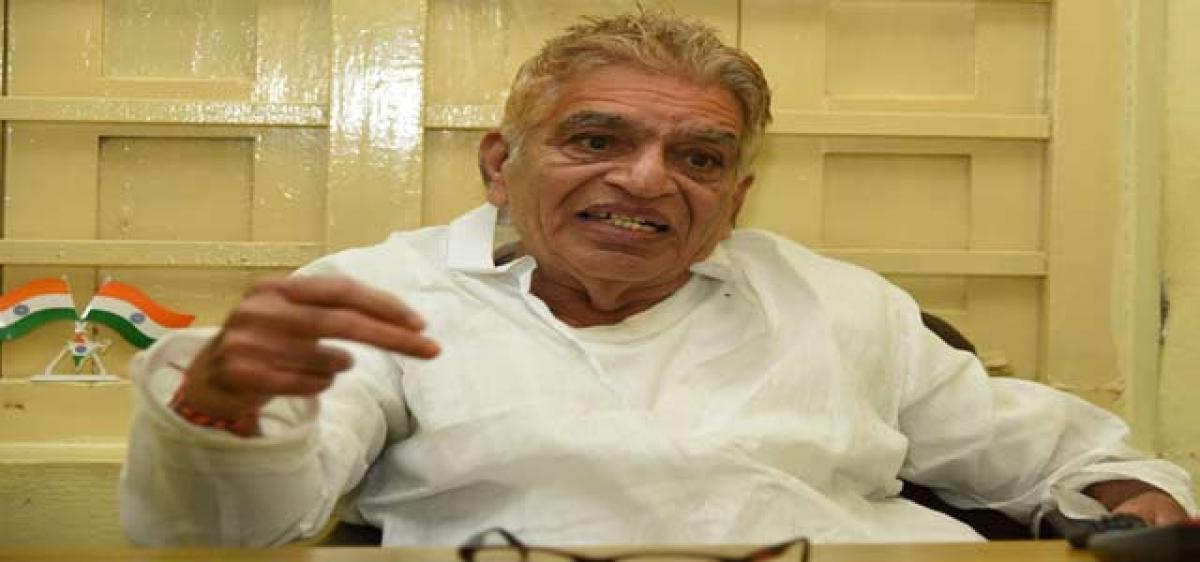Live
- Ayija BJP Celebrates Telangana Liberation Day and Honorable Prime Minister Narendra Modi's Birthday
- Ganesh Visarjan: Peaceful Immersion Process Underway in Hyderabad, says CP
- Social media platforms must register with DIPR: Meghalaya govt
- Collective Efforts Ensure Peaceful Ganesh Immersion: Cyberabad CP
- Nagaland killings: SC closes FIR, criminal proceedings against Army personnel
- Softening of WPI inflation to cut production costs, demand surge for consumption
- ‘Humbled & honoured’, says PM Modi on receiving birthday wishes
- Atishi as Chief Minister will be national security concern: Tarun Chugh
- Praja Palana Day Celebrations at Cyberabad CPO
- Telangana Government to Announce New Policy for SMEs Tomorrow
Just In

Ramaiah, who is an acclaimed expert in IIT coaching in mathematics, in an exclusive interview to The Hans India said that teaching had been a passion when he started his journey as a graduate teacher.
Hyderabad: Eminent educationist Chukka Ramaiah, who is also popularly known as IIT Ramaiah, turns 90 on Sunday.
Ramaiah, who is an acclaimed expert in IIT coaching in mathematics, in an exclusive interview to The Hans India said that teaching had been a passion when he started his journey as a graduate teacher.
But now education has become an enterprise in which parents have turned into partners, students as the consumers, and teachers are playing the role of shopkeepers.
Sharing his long experience and reflections on education system, he said, in the early days of his journey, there was a purpose behind taking to the profession of teaching.
The quantum of salary was not the main criteria. They had a dream and a goal which was aimed at moulding the younger generation into worthy citizens.
But now, education has been turned into an enterprise for profit. In this scenario students have become customers, parents have become shareholders and teachers are being reduced to the role of shopkeepers.
Advent of Marketing Technology in the education sector has even brought changes in the outlook of people towards education. All this has resulted in the fall of standards, he said.
Ramaiah said that “During the pre-independence era higher education has attracted people with liberal values. Everyone considered taking part in the movement for Independence as a great honour.
Education during the British regime was meant to promote adherence to the king and to work for him. Similar was the case with Nizam's rule. The textbooks used to contain praise for the king after the prayer.
However, post Independence education had become a tool to instil the values of equality, fraternity and secularism.
After the Kothari Commission recommendations came social transformation had become the main agenda for education.
Explaining the key changes that took place from 1970’s, he said, research in science and mathematics has ushered in sea change, for example: study in cell sciences had facilitated transplantation of organs.
And similar changes had been brought in engineering. “In my early days of journey, study of engineering had been confined only to civil and mechanical engineering.
However, the research in the field had expanded the field of engineering, he said. But, over a period of time, it appears that the purpose of education which should be a tool to better the lot of underprivileged and oppressed classes in the society had been lost.
Even in places of higher education like universities, people from the underprivileged and neglected classes are not given proper attention and, “this needs a course correction,” Ramaiah said.
For this, he felt that the government should provide same standard of elementary education and special attention to the “first learners” who are socially backward, so that they can catch up with their counterparts.
Creating necessary infrastructure, encouraging students in relevant fields identifying their talents, providing bridge schools for the slow learners are some of the measures which need to be taken, the nonagenarian educationist suggested.
Referring to digital education, Ramaiah pointed out that it might bring some positive results. But, it simplifies the role of a teacher in a classroom.
In the process, “interaction between the teacher and a student will be missing.” Recollecting, how he had been benefitted by learning from his own students, co-teachers and others, he claimed that he is indeed proud of being a teacher.

© 2024 Hyderabad Media House Limited/The Hans India. All rights reserved. Powered by hocalwire.com







